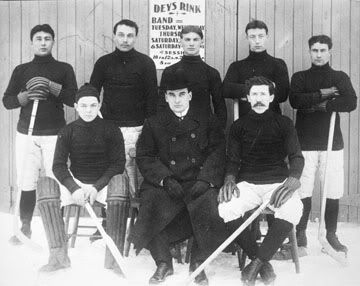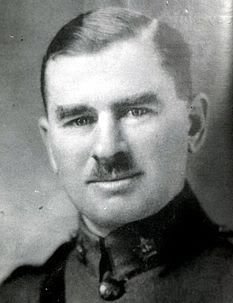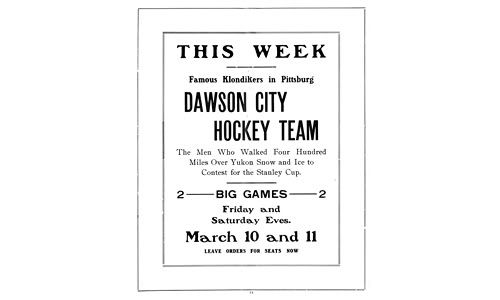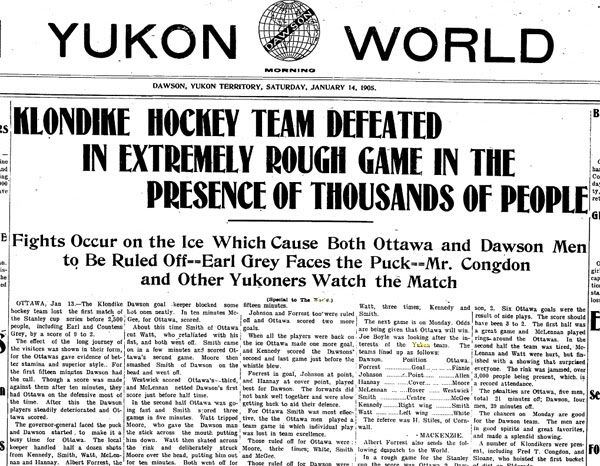(11AM EST – promoted by Nightprowlkitty)
On December 18, 1904, seven men left for Ottawa. Their objective: to win the Stanley Cup.
However, the interesting part of this story isn’t the ice hockey game. That was rather anti-climatic compared to what led up to the match itself.
Back in 1905 the Stanley Cup of the Federal Amateur Hockey League was still a “challenge cup”. In other words, literally anyone, if they were accepted, could challenge for the championship. In this case, the champions were the Ottawa Silver Seven (renamed to Ottawa Senators in 1908).
Ottawa finished the season with a 7-1 record and was led by centre Frank “One-Eyed” McGee. Despite being blind in one eye, McGee still managed to score more than five goals in a game eight times in his career, 135 goals in just 45 games. Six of the starting seven players on the team would wind up in the Hockey Hall of Fame.
The Dawson City Nuggets
4,400 miles away in the Yukon, Joseph Whiteside Boyle, better known as Klondike Joe, was building a small gold-mining empire. Once the placer mining had dried up in 1900, Boyle was the first to turn to large-scale dredging, which devastated the landscape.
Why Boyle is important to this story is because he was a huge hockey fan. He had built a state-of-the-art covered arena in Dawson. While on a trip to Ottawa, he challenged the Ottawa team, and it was accepted.
Now Boyle just needed a team.
Boyle organized an all-star team which included Weldy Young, a civil servant, “Sureshot” Kennedy, Hector Smith, Dr D. McLennan, who would play rover, and J.K. Johnstone, a former Mountie. The team would pick up cover-point Lorne Hannay in Winnipeg. Quebec native Albert Forrest, only 17 years old, would play goal.
Forrest was a great skater, but had never played goalie before. He’s still the youngest player in Stanley Cup history.
McLennan was the only one to have played professionally.
Their best player, former Ottawa star Weldy Young, who was doubling as a coach, was unable to leave with the team due to hus duties as an elected official. Young had formerly played with the Silver Seven but left in disgrace after attacking the fans in 1898. He would leave later and try to catch up with the team.
Captain Lionel Bennett, a civil servant originally from Nova Scotia, also declined. He decided to stay with his injured wife, who had been dragged by a runaway sled.
Boyle funded the team with $3,000, which was short of what they needed for expenses. The players would front some of the money themselves and hoped to make up the difference and more with gate receipts.
There was another larger problem: in 1904 there were no real roads out of Dawson.
Dawson was a frontier town of 26,000. It had wooden sidewalks and dirt streets and not one stoplight.
On Sunday, December 18, four of the players left by dog sled. Three others followed the next day by bicycle because snow had been negligible. Their first objective was Whitehorse – 560 kilometers away. From there the plan was to board the White Pass & Yukon Railway for Skagway. Then they would take a steamer to Vancouver, where they would take a train across most of the continent to Ottawa.
Almost from the start, everything went wrong. The first couple days were fine, but then the weather turned warm. There was not enough snow on the ground for the dog sleds. In the rugged terrain the bicycles broke down. Eventually the players had no choice but to walk the several hundred miles to Whitehorse.
“The first day the Klondikers covered 46 miles, the second 41. The third day saw them struggling to cover 36 miles, some suffering with blistered feet. To proceed, these had to remove their boots. It may give an idea of the hardship they faced when it is recorded that the temperature sank to 20 degree below zero during the mush from Dawson City west to Skagway, Alaska (via Whitehorse).”
The team would spend nights in police sheds along the way. It took them nine days for this leg of the journey.
Then things got worse.
When they finally reached Whitehorse a blizzard struck. An avalanche temporarily knocked out the White Pass and Yukon rail line to Skagway.
This delay was to prove crucial. The team finally made it to Skagway just in time to see their scheduled steamer leave port. They missed it by two hours.
It would take another five days before another steamer would take them south. The players didn’t use the time wisely.
“Hanging out in Skagway,” wrote a later observer, “did nothing for the team conditioning. They were in serious liver training.”
After going on a five day bender, they were finally headed south again on New Year’s Eve. Their string of bad luck continued when the ship ran into a storm and missed Vancouver completely. The team ended up in Seattle instead.
They had to board a train for the 200 mile trip back up to Vancouver (during which the party continued), where they boarded another train to take them to Ottawa.
They wouldn’t arrive in Ottawa until January 11, 1905, two days before the match. The weary team asked that the game be postponed for a couple days, but the request was declined.
The team checked into a local hotel and then made for a sporting goods store to buy uniforms.
Stanley Cup Match
Despite suffering from exhaustion and not having practiced for nearly a month, the Nuggets still talked trash. When they watched the Silver Seven practice before the match they claimed to not being impressed.
One Nugget declared that Ottawa star Frank McGee was “not that hot.”
The Dey Arena was crowded with 2,200 spectators for the first game in a best-of-three set.
The Nuggets were clearly over-matched, but managed to stay in the game with extremely physical play. At half-time (back then there were only two periods) the Nuggets were only down 3-1, despite Watt and Forrest spending much of the half in the penalty box.
“Watt tripped Moore, who gave the Dawson man a stick across the mouth, putting him down. Watt then skated across the rink and struck Moore over the head putting him out for ten minutes,” said the news account in the Yukon World.
The Nuggets held One-Eyed McGee, Ottawa’s best player, who averaged nearly a hat trick per game in his career, to just one goal. This induced the Dawsonites to repair to a local bar and boast they’d win the next match by bottling up McGee.
The game ended 9-2 for Ottawa.
Boyle blamed officiating for the loss. But the Toronto Telegram reported the Nuggets “faded away like a snowball beneath a June sun.”
the Ottawa Journal reported “The visitors were clearly outclassed. It is true they hardly had time to get in shape, but the form they showed was most mediocre.”
What is worse, word got back to McGee about the Nuggets’ boast.
Three days later, at Game 2, McGee would score three goals in the first 90 seconds of the game, and four in the first half.
He was only warming up.
McGee scored 10 more goals in the second half alone, as Ottawa destroyed the Nuggets 23-2 in the most lopsided victory in Stanley Cup history.
“Dawson never had the chance of a bun in the hands of a hungry small boy,” mocked the Ottawa Citizen.
The newspapers reported that Forrest played a good game, and that if he hadn’t the score “might have been doubled.”
Aftermath
As if to put an exclamation point on the odyssey, McLennan and Watt learned the day after the second game that they were being laid off of work back in the Yukon, effective immediately.
The Dawson City Nuggets stayed back east and played 23 exhibition games before the long trip back to the Yukon. The players managed to use the time to recoup their travel expenses.
The league tightened up the rules after this episode to make certain there wouldn’t be a repeat of such a lopsided match.
McGee enlisted in the military in 1915. He was killed in action in the Battle of the Somme on September 16, 1916. His body was never recovered.





2 comments
Author
to play a game is what I would call dedication or love of the game! I’ve never missed a Stanley Cup night since I came here, but I missed work, weddings, birthdays and other celebrations and I don’t feel bad. I love the game and I don’t care who plays. 🙂